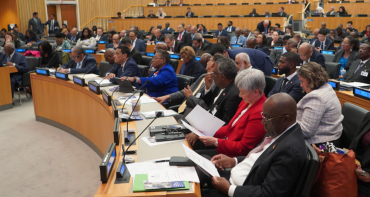By Owen Tudor, Secretary of the Commonwealth Trade Union Group, a Commonwealth-accredited organisation.

A new survey on workers’ rights around the world suggests that the Commonwealth is performing better than other country blocs, yet more can be done to improve workers’ rights at a time of increased geopolitical shifts.
According to the International Trade Union Confederation's (ITUC) Global Rights Index 2025, workers are suffering globally from attacks on the independent organisations that protect them as well as restrictions on key freedoms such as assembly, association and expression. The index was launched on 2 June at the opening of the 113th Session of the International Labour Conference, International Labour Organization (ILO).
Commonwealth countries show slight improvement over 2024
The latest survey shows that while workers’ rights were under stress, Commonwealth countries did slightly better this year compared to last year as compared to non-Commonwealth countries (CTUG report on the Global Rights Index in Commonwealth countries).
Based on reports from 151 ILO member states, including 35 Commonwealth countries, the ITUC survey reports a growing trend for governments to promote and feed off attacks on trade unions. The position in the 35 Commonwealth countries is far from perfect, but shows signs of bucking this trend.
The survey assesses countries' performance against 96 international regulations and standards, scoring each country from 1 to 5. Additionally, 12 countries received a score of 5+ having been assessed as having no guarantee of rights due to the breakdown of the rule of law as a result of internal conflict and/or military occupation. No Commonwealth countries received this score.
Overall, the Commonwealth averages a score of 3.54, falling between regular and systematic violations of rights. Just a sixth of Commonwealth countries covered by the survey are in category 5 (compared with a quarter of non-Commonwealth countries).
Top performers and areas of progress
The best performing Commonwealth countries, according to the ITUC survey, were Australia, Barbados, Ghana, Malawi, New Zealand and Singapore. And three of the four countries identified by the ITUC as having unions “pushing back” are in the Commonwealth: Canada, Ghana and Mauritius.
The Commonwealth’s admittedly marginal improvement since 2024 (up from 3.56) is mostly down to Australia’s recent Fair Work Legislation Amendment (Protecting Worker Entitlements) Act 2023, the UK’s Employment Rights Bill before parliament, and the renewal of democracy in Gabon, where trade unionist Patrick Barbera Isaac is the new Minister of Labour, Full Employment and Social Dialogue.
However, according to the report, several Commonwealth countries continue to face challenges due to the inadequacy of workers' rights – notably Bangladesh, Eswatini, Nigeria, India, Malaysia and Pakistan.
A tool for measuring and partnering for progress
The survey gives Commonwealth governments a measure of how well – or badly – working people’s rights are doing, and trade unions in each Commonwealth country, as well as the ILO, are ready to work in partnership with them to improve their performance.
The Commonwealth Trade Union Group which operates under the umbrella of the ITUC and represents 70 million trade unionists in 46 Commonwealth countries is urging Commonwealth governments to tackle these issues, re-establishing Commonwealth Labour and Employment Ministers Meetings, which fell into abeyance in the 1990s.
But for now, the Commonwealth is performing better on workers’ rights than other regions and blocs around the world. This regular survey will allow further progress to be measured and implemented.



